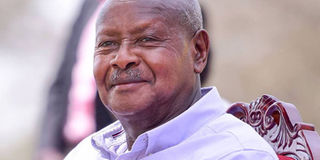Prime
Activists ask Museveni to stop Lwera destruction

President Museveni. FILE PHOTO
What you need to know:
- Mr Richard Vvube, the Kalungu District environment officer, said Lwera wetland is not a gazetted wetland -something that has given a leeway to people acquiring land titles.
- A report by Natural Resources Parliamentary committee of 2016 revealed that sand miners had affected fish stocks within Lake Victoria since Lwera wetland acted as a breeding area.
KALUNGU. Environmental activities under Citizen Concern Africa (CICOA) have asked President Museveni to intervene and stop the ongoing destruction of Lwera wetland on Kampala–Masaka highway in Kalungu District.
Lwera swamp is a major water catchment area for Lake Nabugabo, an important stop-over point for a number of migratory birds and among the few Ramsar Sites ( a site designated to be of international importance under the Ramsar Convention) .
Mr Sam Mucunguzi, the programme coordinator CICOA, said Lwera is heavily degraded by sand miners and rice growers.
“Our President [Museveni] has of late become a strong advocate of environmental conservation and we have heard him on several occasions asking encroachers to vacate wetlands and forests. We now ask him to walk the talk and stop all those bent on destroying Lwera wetland,” Mr Mucunguzi said while inspecting the degraded section of Lwera on Sunday.
“Our target was to get 1,500 signatures, but more people have signed the petition. We want both the President and Parliament to prevail over those investors destroying Lwera Swamp,” he added.
Degradation
Last month, environmentalists under National Association of Professional Environmentalists accused individuals and Chinese companies of degrading Lwera wetland while carrying out excavation of sand and growing rice which have negatively impacted on the areas eco-system.
This came days after Daily Monitor broke a story about Chinese investors, who are currently expanding their rice fields closer to Kampala–Masaka highway. The Chinese say they shifted to the side of highway because it is more environmentally friendly than destroying the fragile part of the wetland on Lake Victoria shores.
The State Minister for Environment, Mr Gorreti Kitutu, has since defended the activities in Lwera, saying they are regulated and will not affect the eco system.
“I want to allay fears of those who think that what is going on will cause a catastrophe that is not true.” the minister said during a recent interview.
Dr Tom Okurut , the executive director Nema, said they cleared most of the activities in Lwera. However, he said they were yet to establish whether the investors still stick to guidelines issued to them.
“The rice project, for example, is supported by the Ministry of Agriculture and it was cleared after carrying out an environmental impact assessment. However, I am not aware of the expansion of rice fields. We shall dispatch our team to carry out fresh assessment,” he said.
Mr Richard Vvube, the Kalungu District environment officer, said Lwera wetland is not a gazetted wetland -something that has given a leeway to people acquiring land titles.
“It is true, Lwera is a wetland, but since it is not gazetted as a ramsar such as Nabajjuzi or Nabugabo, the existing law allows the regulator, Nema, to authorise environmentally friendly activities to take place,” he said, adding that unless Parliament changes the existing law, similar wetlands of great importance will continue to be encroached upon.
Due to its strategic location on the Kampala–Masaka highway, Lwera swamp has in the past decade attracted many investment companies and individuals, who are engaging in sand mining, fish farming and crop growing.
2016 REPORT
A report by Natural Resources Parliamentary committee of 2016 revealed that sand miners had affected fish stocks within Lake Victoria since Lwera wetland acted as a breeding area. It recommended for the banning of sand mining, but nothing has been done to date.



